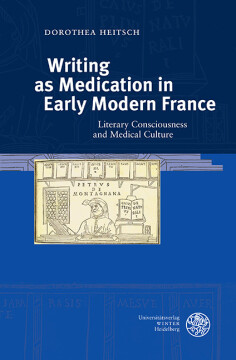
BUCH
Writing as Medication in Early Modern France
Literary Consciousness and Medical Culture
Regensburg Studies in Gender and Culture, Bd. 9
2017
Zusätzliche Informationen
Bibliografische Daten
Abstract
In this study, D. Heitsch examines fifteenth- to seventeenth-century French authors who treat writing as a process of medication and whose literary production effectively yields a therapeutic substance. Through reference to Plato, Aristotle, Galen, Ficino, and advocates of alternatives to Western medicine such as John Mesue and Leone Ebreo, these writers emphasize the material/gendered soul and the role of the body in cognitive functions, illustrating knowledge as a result of physical interaction. The study explores Hélisenne de Crenne alongside the ‘pneumo-physiology’ of Galen and the ‘dolce stil novo’, Rabelaisian anatomy together with the anti-Arabist Champier, and debates among natural philosophical poets on the transmigration of souls. The author also considers Marie de Gournay in relation to Juan Huarte’s humoral theory and Jean d’Espagnet’s alchemical philosophy, as well as Michel de Montaigne’s interest in Jacques Dubois’s Arab-influenced approaches to medicine.
Inhaltsverzeichnis
| Zwischenüberschrift | Seite | Aktion | Preis |
|---|---|---|---|
| Cover | Cover | ||
| Titel | III | ||
| Imprint | IV | ||
| Contents | V | ||
| Acknowledgments | VII | ||
| Introduction | 1 | ||
| Methodology | 10 | ||
| Chapter Summaries | 13 | ||
| Leone Ebreo’s "Dialoghi d’amore": Appeal and Reception | 16 | ||
| 1 Medico-Philosophical Concepts in Leone Ebreo’s "Dialoghi d’amore" | 25 | ||
| Love and Cognition in Pico, Ficino, and Ebreo | 27 | ||
| Cognition as Copulation in the "Dialoghi d’amore" — Embodied Knowledge-Making | 34 | ||
| Anima Appetens – Mating Soul and Transmigration | 41 | ||
| Conclusion and Outlook | 47 | ||
| 2 Female Love-Melancholy: Hélisenne de Crenne, Galen, and the Dolce Stil Novo | 51 | ||
| Love’s Cause and Its Effect on Hélisenne | 57 | ||
| Love, Melancholy, and the Imagination | 60 | ||
| Love, Melancholy, and the Dolce Stil Novo | 66 | ||
| Encountering the Other’s Gaze | 70 | ||
| Conclusion: Diagnosis, Potential Cure, and Literary Inspiration | 74 | ||
| 3 Death, Resurrection, and the Anatomy of Epistemon in François Rabelais’s Pantagruel | 79 | ||
| Literal: Epistemon’s Death and Resurrection — The Panurgic Cure | 83 | ||
| Allegorical: Epistemon’s Anatomy | 85 | ||
| Tropological: Literary Context and Moral Significance | 87 | ||
| Toward an Anagogical Interpretation: A. ‘Arabist’ and ‘Anti-Arabist’ Medical Practitioners | 89 | ||
| Toward an Anagogical Interpretation: B. Symphorien Champier and François Rabelais | 92 | ||
| Anagogical: (Spiritual) Panacea and the Success of Panurge’s Wager | 96 | ||
| Conclusion | 98 | ||
| 4 Renaissance Soul-Searching and Natural Philosophical Poetry | 101 | ||
| An Infinite Mind: Maurice Scève’s Microcosme (1562) | 106 | ||
| A Journey through the Cosmos (of Love): Transmigration in "L’amour des amours" (1555) | 110 | ||
| Ambiguous Mediators: Demons, Plants, Animals, and Philosophy in Ronsard’s "Hymnes" (1555, 1556) and “Le chat” (1569) | 118 | ||
| The All-Encompassing Protestant Soul in Du Bartas’s Creation (1578, 1584) | 126 | ||
| René Bretonnayau and the Cosmic Temple of the Soul (1583) | 133 | ||
| Conclusion | 137 | ||
| 5 Constitution of the Female Author: From Temperament to Alchemy in the Work of Marie de Gournay | 141 | ||
| Temperament, Complexion, Character | 142 | ||
| Juan Huarte de San Juan and the "Examination of Men’s Wits" | 145 | ||
| Alchemy and Gender | 150 | ||
| Marie de Gournay as Practitioner of Alchemy | 152 | ||
| Alchemy and Writing: Transmuting Texts, Transmuting Relationships | 156 | ||
| Alchemical Images—Androgynous Souls | 164 | ||
| Conclusion: Androgynous Souls as Political Concepts | 169 | ||
| 6 Evacuative Strategies in Jacques Dubois and Michel de Montaigne | 173 | ||
| Jacques Dubois (Jacobus Sylvius) and Mesue’s "Opera" | 176 | ||
| Medical Practice: Drugs and Purging in the "Essais" | 182 | ||
| Occult Force and Quintessence: The Ambiguous Nature of Rhubarb | 188 | ||
| Purging Body and Soul: Montaigne’s Embodied Cognition | 190 | ||
| Exemplum, Consilium, Observatio, Historia Montani | 196 | ||
| Conclusion: Evacuative Strategies and Spiritual Exercise | 200 | ||
| Conclusion | 205 | ||
| Literary Consciousness and Medical Culture | 212 | ||
| Bibliography | 217 | ||
| Index Nominum | 251 | ||
| Index Rerum | 259 | ||
| Backcover | 261 |


 Publishing Platform by CloudPublish
Publishing Platform by CloudPublish